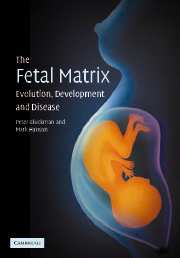Book contents
- Frontmatter
- Contents
- Preface
- 1 Shaping our destiny: genes, environment and their interactions
- 2 Mother and fetus
- 3 Fetal choices
- 4 Predictive adaptive responses and human disease
- 5 Obesity, diabetes and other diseases
- 6 The biology of predictive adaptive responses
- 7 Predictive adaptive responses – critical processes in evolution
- 8 Evolutionary echoes and the human camel
- 9 Improving human health
- 10 Fetal futures
- Further reading and references
- Index
5 - Obesity, diabetes and other diseases
Published online by Cambridge University Press: 05 November 2011
- Frontmatter
- Contents
- Preface
- 1 Shaping our destiny: genes, environment and their interactions
- 2 Mother and fetus
- 3 Fetal choices
- 4 Predictive adaptive responses and human disease
- 5 Obesity, diabetes and other diseases
- 6 The biology of predictive adaptive responses
- 7 Predictive adaptive responses – critical processes in evolution
- 8 Evolutionary echoes and the human camel
- 9 Improving human health
- 10 Fetal futures
- Further reading and references
- Index
Summary
The previous chapter focused on the early-life antecedents of hypertension and heart disease. First, this was where the epidemiological story started and as a result most clinical and experimental work derived from these initial observations. Second, it also drew attention to the central role of nutrition as a signal to the fetus of its potential future environment. Thirdly, it drew attention to the role of postnatal nutrition and obesity in the progression of the PARs cascade.
The role of nutrition as a key postnatal environmental determinant for reaching reproductive competence is easy to understand. There is, for example, clear evidence that nutrition and reproductive competence are linked: fecundity is influenced by nutritional status at mating in many species. In all mammals, humans included, the passage of the genome from one generation to the next can be preserved despite a slow growth rate in a poor environment, so long as reproductive competence is achieved. Thus adaptive responses that include insulin resistance, associated with small muscle mass and lower capillary density in many tissues, give an appropriate survival route (for the genotype) if the organism expects to live in a deprived postnatal environment. Conversely if that predictive choice has been made, but the environment turns out to be enriched, then it is easy to see how this will become manifest as a greater risk of hypertension and diabetes.
- Type
- Chapter
- Information
- The Fetal Matrix: Evolution, Development and Disease , pp. 103 - 117Publisher: Cambridge University PressPrint publication year: 2004



